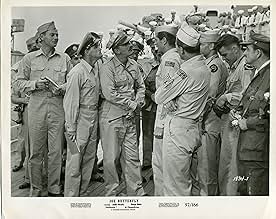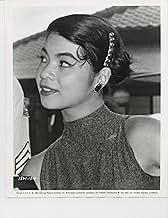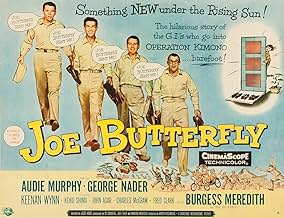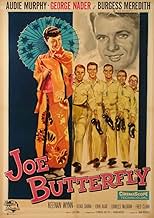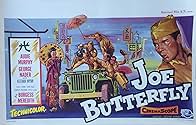IMDb-BEWERTUNG
5,9/10
309
IHRE BEWERTUNG
Füge eine Handlung in deiner Sprache hinzuAmerican soldiers in occupied Tokyo get mixed up with a conniving black-marketeer.American soldiers in occupied Tokyo get mixed up with a conniving black-marketeer.American soldiers in occupied Tokyo get mixed up with a conniving black-marketeer.
Keiko Shima
- Chieko
- (as Kieko Shima)
Willard W. Willingham
- Soldier
- (as Willard Willingham)
Chuck Barnes
- Reporter
- (Nicht genannt)
Empfohlene Bewertungen
Especially a rare film, though the worst where Audie Murphy played in, at least for my taste. One of the hardest to find from director Jesse Hibbs, who was for Murphy the same that Jo Pevney was for Jeff Chandler, or Tony Mann for Jimmy Stewart and John Frankenheimer for Burt Lancaster. It is lousy, a bit boring but fun to watch if you are in the good mood. Of course a war comedy could hardly existed without murphy, despite the fact that he never fought in real life on the Pacific front. I am lucky enough to have caught in in LBX - 2.35 frame.
Audie Murphy, the decorated WW II soldier is remembered today for his entertaining westerns and war films of the post war era. However, in this comic outing, Murphy and pals hit post war Japan and all sorts of hi-jinks develop in quick succession.
Audie is at ease here in the title role and brings an easy-going charm to a slightly above-average storyline. Keenan Wynn and John Agar offer fine support in a pleasing film that served to stretch Murphy out of his westerns rut.
This is the sort of film that demands little from the viewer, yet provides a pleasant viewing experience even for non-fans of the legendary war hero. Well worth another look.
Audie is at ease here in the title role and brings an easy-going charm to a slightly above-average storyline. Keenan Wynn and John Agar offer fine support in a pleasing film that served to stretch Murphy out of his westerns rut.
This is the sort of film that demands little from the viewer, yet provides a pleasant viewing experience even for non-fans of the legendary war hero. Well worth another look.
Comedies about U.S. troops in occupied Japan were kind of a subgenre in the 1950s. Many of them were as much sentimental as funny, and that's true of "Joe Butterfly." It's far from hilarious but gives you a warm feeling.
The casting may seem strange, with action star Audie Murphy in a comic role and Burgess Meredith playing an Asian. But both are pretty good. Murphy plays a member of a military journalism unit arriving in Tokyo just after the war. Meredith's quaintly named character, "Joe Butterfly," is a roguish but likable black marketeer who latches on to him.
Not many movies about the military deal much with the black market, unless to treat it as something exotic and sinister. But it was part of life for U.S. troops stationed in places like Japan in the 1940s, and this movie is less judgmental about it than most.
Murphy, boyish-looking and soft-spoken, is the heart of the film. His character is easygoing, almost naive, whether he's befriending Joe or falling in love with a Japanese girl.
This is not as strange as it sounds. Though he got to Hollywood because of his real-life World War II heroics, and then played mostly tough guys, Murphy was never crazy about war films. He made only two movies actually set in World War II. When he did play men in uniform, he liked films that humanized the GI. This film does that.
Recruiting a famous white actor to play a major Asian role may seem strange today. It may even seem offensive. But it used to be done frequently, so maybe it's forgivable. Meredith gives it his best shot.
If you don't expect too much, this one is worth a look.
The casting may seem strange, with action star Audie Murphy in a comic role and Burgess Meredith playing an Asian. But both are pretty good. Murphy plays a member of a military journalism unit arriving in Tokyo just after the war. Meredith's quaintly named character, "Joe Butterfly," is a roguish but likable black marketeer who latches on to him.
Not many movies about the military deal much with the black market, unless to treat it as something exotic and sinister. But it was part of life for U.S. troops stationed in places like Japan in the 1940s, and this movie is less judgmental about it than most.
Murphy, boyish-looking and soft-spoken, is the heart of the film. His character is easygoing, almost naive, whether he's befriending Joe or falling in love with a Japanese girl.
This is not as strange as it sounds. Though he got to Hollywood because of his real-life World War II heroics, and then played mostly tough guys, Murphy was never crazy about war films. He made only two movies actually set in World War II. When he did play men in uniform, he liked films that humanized the GI. This film does that.
Recruiting a famous white actor to play a major Asian role may seem strange today. It may even seem offensive. But it used to be done frequently, so maybe it's forgivable. Meredith gives it his best shot.
If you don't expect too much, this one is worth a look.
With the American occupation of Japan, the staff of YANK magazine scrambles at the dictate of Colonel Fred Clark to get out a great issue quick, while trying to deal with roving magazine reporter Keenan Wynn. The non-commissioned staff, including George Nader, John Agar, Charles McGraw and photographer Audie Murphy -- who's supposed to have been busted and shipped back to the US -- use local Japanese fixer Joe Butterfly -- played by Burgess Meredith speaking Japanese Double Dutch -- set up in a mansion and try to work.
It's a service comedy from a play by Jack Ruge and Evan Wylie. One of the screenwriters was Marion Hargrove, but it hasn't aged particularly well, thanks to Meredith -- I suppose Sessue Hayakawa was busy trying to be a priest. Wynn gives his typically emphatic comedy performance, but McGraw is actively funny with his rough speaking voice and mug attitude. Overall, it's a tired effort from directed Jesse Hibbs, and the score is a bit controlling, but there are a few chuckles along the way.
It's a service comedy from a play by Jack Ruge and Evan Wylie. One of the screenwriters was Marion Hargrove, but it hasn't aged particularly well, thanks to Meredith -- I suppose Sessue Hayakawa was busy trying to be a priest. Wynn gives his typically emphatic comedy performance, but McGraw is actively funny with his rough speaking voice and mug attitude. Overall, it's a tired effort from directed Jesse Hibbs, and the score is a bit controlling, but there are a few chuckles along the way.
In the late 1950s, American studios discovered a new style film...those set in post-war Japan. Suddenly, in a period of only a couple years, LOTS of these films came out and they ranged from excellent to embarrassing. The excellent films were so good because they were timeless and chose to have Japanese actors play the Japanese, such as with "Sayonara" and "The Geisha Boy". The embarrassing ones were the ones where the studios unwisely chose to cast American actors as these Japanese and their 'interpretation' is pretty awful. These lacky-type characters were greatly exaggerated Japanese stereotypes. People at the time liked the films but today they just haven't aged very well. Imagine Marlon Brando as an Okinawan in "The Teahouse of the August Moon" and here, in "Joe Butterfly", Burgess Meredith playing an oily black marketeer! Uggh. While I am not the most PC sort of guy, seeing Americans overdoing it is just embarrassing and sad...especially when great Japanese actors could have used the work.
The story begins with the first ships entering Japan to being the occupation in late 1945. For some inexplicable reason, some military higher-up has decided that the Army's "Stars & Stripes"-style magazine will bring out an occupation edition...in three days! Why three days? Who knows. But the problem is Tokyo has been firebombed and there is little left...little room for offices, no equipment and no resources. So the men must either NOT produce the magazine and face the consequences OR work with the local black market to get what they need. That is where Joe Butterfly comes into the story and he's assisted by the similarly inclined Private Woodley (Audie Murphy) to get things done.
Although the casting of Meredith is embarrassing, it didn't apparently hurt his career and you don't usually hear folks talking about how bad it was. But the film does excel with the rest of its casting...a fine group of mostly supporting actors who are very familiar faces. The film features George Nader in the lead along with the likes of Charles McGraw, Keenan Wynn, Fred Clark, Eddie Firestone, John Agar, and Herbert Anderson and all are excellent.
So despite the 'squirm factor' of seeing Meredith overdoing it as Joe, is the film worth seeing? Well, yes. The film is quite entertaining and generally treats the Japanese well (apart from Joe Butterfly). The script is very good and the dialog excels. I just can't score it any higher due to Joe Butterfly.
By the way, although the film did talk about food and housing shortages, the reality was much worse and this is a highly sanitized version of Japan circa 1945. A major percentage of Tokyo was literally leveled by carpet bombing and the destruction is something difficult to repeat in 1957. The best film to show this sort of post-WWII destruction might just be "Germany Year Zero" and I cannot think of any set in Japan that so well capture the post-war horror.
The story begins with the first ships entering Japan to being the occupation in late 1945. For some inexplicable reason, some military higher-up has decided that the Army's "Stars & Stripes"-style magazine will bring out an occupation edition...in three days! Why three days? Who knows. But the problem is Tokyo has been firebombed and there is little left...little room for offices, no equipment and no resources. So the men must either NOT produce the magazine and face the consequences OR work with the local black market to get what they need. That is where Joe Butterfly comes into the story and he's assisted by the similarly inclined Private Woodley (Audie Murphy) to get things done.
Although the casting of Meredith is embarrassing, it didn't apparently hurt his career and you don't usually hear folks talking about how bad it was. But the film does excel with the rest of its casting...a fine group of mostly supporting actors who are very familiar faces. The film features George Nader in the lead along with the likes of Charles McGraw, Keenan Wynn, Fred Clark, Eddie Firestone, John Agar, and Herbert Anderson and all are excellent.
So despite the 'squirm factor' of seeing Meredith overdoing it as Joe, is the film worth seeing? Well, yes. The film is quite entertaining and generally treats the Japanese well (apart from Joe Butterfly). The script is very good and the dialog excels. I just can't score it any higher due to Joe Butterfly.
By the way, although the film did talk about food and housing shortages, the reality was much worse and this is a highly sanitized version of Japan circa 1945. A major percentage of Tokyo was literally leveled by carpet bombing and the destruction is something difficult to repeat in 1957. The best film to show this sort of post-WWII destruction might just be "Germany Year Zero" and I cannot think of any set in Japan that so well capture the post-war horror.
Wusstest du schon
- VerbindungenReferenced in What's My Line?: Charles Laughton (1956)
- SoundtracksYou Are My Sunshine
(uncredited)
Written by Jimmie Davis
Sung by various members of the cast at different times
Top-Auswahl
Melde dich zum Bewerten an und greife auf die Watchlist für personalisierte Empfehlungen zu.
Details
- Laufzeit
- 1 Std. 30 Min.(90 min)
- Seitenverhältnis
- 2.35 : 1
Zu dieser Seite beitragen
Bearbeitung vorschlagen oder fehlenden Inhalt hinzufügen

